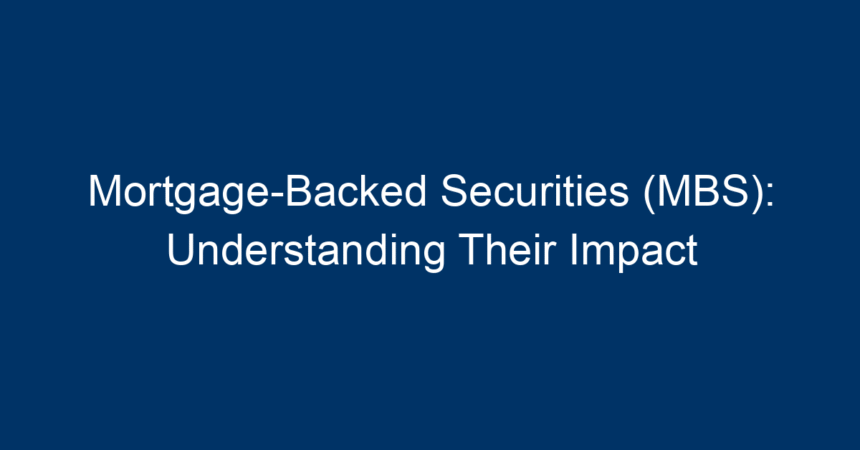Introduction
In the ever-evolving world of finance, few instruments play as pivotal a role as mortgage-backed securities (MBS). Often misunderstood, MBS serve as a critical bridge between individual homeowners and the broader capital markets, facilitating homeownership while attracting a wide range of investors. Understanding these securities is essential for both potential investors and homebuyers alike. In this article, we’ll explore the intricacies of mortgage-backed securities, their impact on the housing market and economy, and offer actionable insights for those looking to navigate this complex terrain.
What Are Mortgage-Backed Securities (MBS)?
Mortgage-backed securities (MBS) are investment products created from a pool of home loans. They represent claims on the cash flows generated from these mortgages, allowing investors to earn returns based on the principal and interest payments made by homeowners. MBS can be categorized broadly into two main types:
-
Agency MBS: Issued by government-sponsored enterprises like Fannie Mae and Freddie Mac, these securities typically have lower risk due to the implicit government backing.
- Non-Agency MBS: These are issued by private entities and do not carry government guarantees. They usually offer higher yields but come with greater risk.
Understanding the foundational mechanics of MBS is crucial for grasping their broader significance in financial markets.
How MBS Work
The Process of Creation
The journey of mortgage-backed securities begins when banks or mortgage lenders issue loans to homebuyers. Once a bank has a portfolio of these loans, it can bundle them into a security. This process involves pooling together hundreds or thousands of individual mortgages, which are then sold to a special-purpose vehicle (SPV).
- Origination: Homebuyers secure mortgages from lenders.
- Pooling: Lenders group these mortgages together into a single entity.
- Securitization: The SPV issues securities backed by the mortgage pool, offering them to investors.
- Payment Distribution: As homeowners make their mortgage payments, those revenues are passed along to MBS investors.
Cash Flow Mechanism
Investors in mortgage-backed securities receive periodic payments that consist of both principal and interest. The steady stream of cash flow makes MBS attractive to a variety of investors, including hedge funds, pension funds, and individual investors. The yield from MBS can vary based on interest rates, prepayment speeds, and credit quality of the underlying loans.
The Economic Impact of MBS
Mortgage-backed securities play a crucial role in the economy, influencing both the housing market and investment landscape.
1. Facilitating Homeownership
By transforming individual mortgages into investable securities, MBS significantly increase the availability of capital. This means lenders have more funds available to issue new home loans, thus making homeownership more accessible to the average consumer.
2. Shaping Interest Rates
The demand for mortgage-backed securities can impact mortgage rates. When investors are eager to buy MBS, it can lower the cost of borrowing for homeowners due to increased liquidity in the mortgage market. Conversely, if demand wanes, mortgage rates may rise.
3. Contributing to Financial Stability
During times of economic growth, MBS can contribute to financial stability by allowing banks to offload the risks associated with mortgage defaults. This reduces the likelihood of bank failures stemming from high levels of mortgage non-performance, ultimately contributing to a healthier economy.
Risks Associated with MBS
Despite their benefits, mortgage-backed securities also come with risks that investors should be aware of.
1. Prepayment Risk
One of the most significant risks in MBS is prepayment risk. If interest rates decline, homeowners may refinance their mortgages to obtain lower rates, leading to earlier-than-expected repayments for MBS investors. This can reduce overall returns.
2. Credit Risk
In the case of non-agency MBS, there is a higher likelihood of borrower default. If homeowners fail to make their payments, the cash flows to MBS investors can diminish, impacting overall yields.
3. Market Risk
Fluctuations in the broader market can also affect MBS. Economic downturns, changes in interest rates, and shifting investor sentiment can create volatility in MBS prices.
Recent Trends in Mortgage-Backed Securities
As of 2023, the landscape of mortgage-backed securities is continually evolving. Key trends to note include:
1. Shift Toward Sustainability
There is a growing emphasis on Environmental, Social, and Governance (ESG) criteria in investment decisions. MBS that focus on sustainable housing projects are gaining popularity among socially conscious investors.
2. Technological Innovations
The adoption of fintech solutions in loan origination and servicing is streamlining the process of creating and managing MBS. From digital mortgage applications to blockchain technology, innovations are reducing costs and increasing efficiency.
3. Rate Sensitivity
As central banks adjust interest rates in response to inflation, MBS investors are closely monitoring these changes, as rising rates could lead to a decline in demand for mortgage refinancing, thereby affecting cash flows.
How to Invest in Mortgage-Backed Securities
Investing in mortgage-backed securities can be an attractive option for those seeking stability and regular income. Here are actionable insights:
1. Understand Your Risk Tolerance
Before investing in MBS, it is crucial to evaluate your risk tolerance. Consider your investment goals, time horizon, and how much volatility you are willing to accept.
2. Choose the Right Type of MBS
Whether you opt for agency MBS or non-agency MBS will significantly impact your investment performance. Agency MBS carries lower risk but potentially lower returns, while non-agency MBS offers higher yields with accompanying risks.
3. Monitor Economic Indicators
Stay informed about key economic indicators, such as unemployment rates, inflation, and interest rates. These factors can heavily influence the performance of mortgage-backed securities.
4. Consult Financial Experts
Given the complexities of MBS, consider seeking advice from financial advisors or professionals well-versed in the mortgage and securities markets. They can help tailor an investment strategy to your individual needs.
Conclusion
Mortgage-backed securities (MBS) are a vital component of the financial landscape, influencing homeownership, capital markets, and economic stability. While they offer potential benefits like liquidity and diversification, they also come with their fair share of risks. By understanding how MBS work, their economic impact, and how to invest wisely, both investors and homebuyers can navigate this complex field with greater confidence and success.
Whether you are an investor seeking stable income or a homebuyer considering the implications of MBS, the knowledge gleaned from this article can help guide your decisions in this intricate arena of finance.




